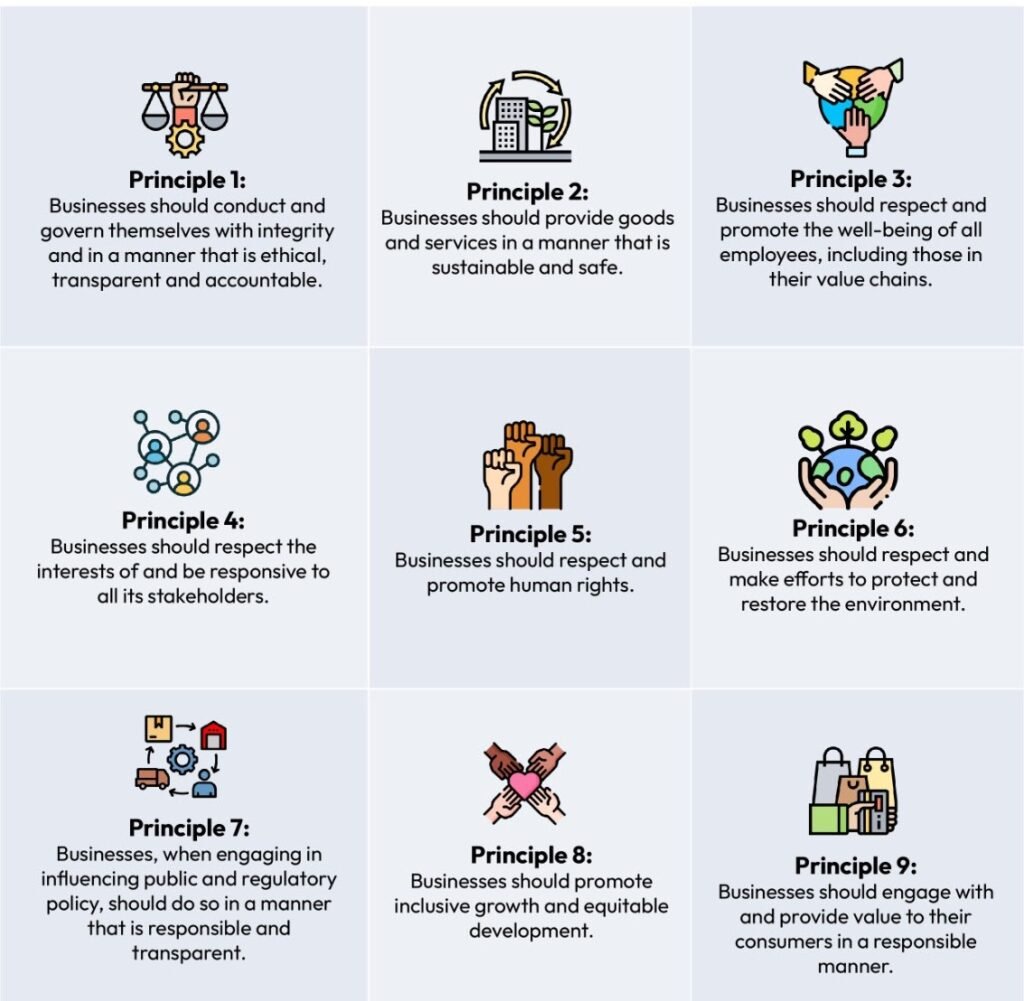BRSR (Business Responsibility and Sustainability Reporting) is a framework designed by SEBI (Securities and Exchange Board of India) to encourage companies to integrate sustainable and responsible business practices into their operations.
Business Responsibility and Sustainability Reporting (BRSR) is a mandatory reporting requirement for all listed entities in India. The initiative was introduced by the Securities and Exchange Board of India (SEBI) in 2012. The BRSR framework aims to encourage listed companies to adopt sustainable business practices and disclose information related to their environmental, social, and governance (ESG) performance.
- The BRSR framework is based on the principle of “comply or explain”.
- It means that listed entities are required to disclose their ESG-related information as per the prescribed format or provide a valid reason for not doing so.
- The BRSR framework covers various aspects of sustainability, including governance, environment, social, customer, supply chain, and human rights.
The BRSR reporting requirement is aligned with global sustainability reporting frameworks, such as the Global Reporting Initiative (GRI) and the United Nations Global Compact (UNGC). It aims to enhance the quality of sustainability reporting by listed entities in India.
SEBI has periodically updated the BRSR framework to keep pace with global developments in sustainability reporting and to ensure that it remains relevant and effective in promoting sustainable business practices among listed entities.
BRSR Principle-wise Performance Disclosure
The BRSR (Business Responsibility and Sustainability Reporting) framework is aimed at helping entities integrate sustainable and responsible practices into their business operations. The Principle-wise Performance Disclosure section of the framework is designed to help entities demonstrate their performance in integrating the principles and core elements with key processes and decisions.
The information sought is divided into two categories – Essential and Leadership. Essential indicators are those that are expected to be disclosed by every entity that is mandated to file the BRSR report. Leadership indicators, on the other hand, may be voluntarily disclosed by entities that aspire to progress to a higher level in their quest to be socially, environmentally, and ethically responsible.
Essential indicators are the minimum requirements that entities need to meet to be considered as fulfilling the reporting requirements of the BRSR framework. These indicators provide an overview of the company’s sustainability and responsible business practices. Examples of essential indicators include details of the company’s sustainability policies, goals, and targets; details of the company’s impact on the environment, health, and safety of employees and other stakeholders; and details of the company’s efforts to promote human rights and support social and economic development.
Leadership indicators, on the other hand, are additional disclosures that go beyond the minimum requirements of the BRSR framework. These indicators are intended for companies that aspire to be leaders in sustainability and responsible business practices. Examples of leadership indicators include details of the company’s efforts to innovate and adopt sustainable and responsible practices; details of the company’s engagement with stakeholders, including customers, suppliers, and communities; and details of the company’s efforts to promote inclusive growth and equitable development.
By disclosing both essential and leadership indicators, companies can demonstrate their commitment to sustainable and responsible business practices, as well as showcase their progress and efforts to become leaders in this area. The BRSR Principle-wise Performance Disclosure section is an important tool for companies to communicate their sustainability performance to stakeholders and create greater transparency and accountability in their operations.

Overview of Principles of BRSR
In recent years, there has been a growing awareness of the importance of business responsibility and sustainability reporting among listed entities in India. The Securities and Exchange Board of India (SEBI) has introduced a set of 9 principles that aim to guide companies in adopting sustainable business practices and reporting them in a transparent and comprehensive manner.
Here’s an overview of the 9 principles of BRSR:
PRINCIPLE 1. Businesses should conduct and govern themselves with integrity, and in a manner that is Ethical, Transparent and Accountable
PRINCIPLE 2. Businesses should provide goods and services in a manner that is sustainable and safe
PRINCIPLE 3. Businesses should respect and promote the well-being of all employees, including those in their value chains
PRINCIPLE 4. Businesses should respect the interests of and be responsive to all its stakeholders
PRINCIPLE 5. Businesses should respect and promote human rights
PRINCIPLE 6. Businesses should respect and make efforts to protect and restore the environment
PRINCIPLE 7. Businesses, when engaging in influencing public and regulatory policy, should do so in a manner that is responsible and transparent
PRINCIPLE 8. Businesses should promote inclusive growth and equitable development
PRINCIPLE 9. Businesses should engage with and provide value to their consumers in a responsible manner
PRINCIPLE 1: Businesses should conduct and govern themselves with integrity, and in a manner that is Ethical, Transparent and Accountable.
This principle focuses on the importance of ethical conduct and transparency in business operations. Companies should follow ethical business practices and adhere to high standards of integrity. They should also be transparent about their activities, operations, and financial reporting, as well as be accountable for their actions.
PRINCIPLE 2: Businesses should provide goods and services in a manner that is sustainable and safe.
This principle highlights the importance of sustainable and safe production practices. Companies should strive to minimize the environmental impact of their activities and ensure that their products and services are safe for consumers and the environment.
PRINCIPLE 3: Businesses should respect and promote the well-being of all employees, including those in their value chains.
This principle emphasizes the importance of employee well-being. Companies should provide safe and healthy working conditions, fair wages, and opportunities for career development to all employees in their value chains, including suppliers, contractors, and temporary workers.
PRINCIPLE 4: Businesses should respect the interests of and be responsive to all its stakeholders.
This principle highlights the importance of stakeholder engagement. Companies should consider the interests and perspectives of all stakeholders, including shareholders, employees, customers, suppliers, and the communities in which they operate. They should also be responsive to stakeholder concerns and feedback.
PRINCIPLE 5: Businesses should respect and promote human rights.
This principle focuses on the importance of human rights. Companies should respect and promote human rights, including the rights to freedom of expression, association, and privacy. They should also prevent and address human rights violations in their operations and value chains.
PRINCIPLE 6: Businesses should respect and make efforts to protect and restore the environment.
This principle emphasizes the importance of environmental stewardship. Companies should minimize their impact on the environment, conserve natural resources, and promote environmental sustainability. They should also take steps to restore and rehabilitate degraded ecosystems.
PRINCIPLE 7: Businesses, when engaging in influencing public and regulatory policy, should do so in a manner that is responsible and transparent.
This principle highlights the importance of responsible advocacy. Companies should engage in policy advocacy in a responsible and transparent manner, and avoid engaging in activities that could undermine the public interest or the democratic process.
PRINCIPLE 8: Businesses should promote inclusive growth and equitable development.
This principle emphasizes the importance of promoting inclusive and equitable economic development. Companies should create economic opportunities for all, including disadvantaged and marginalized groups. They should also contribute to the development of local communities and support social and economic empowerment.
PRINCIPLE 9: Businesses should engage with and provide value to their consumers in a responsible manner.
This principle highlights the importance of responsible consumer engagement. Companies should provide safe, high-quality products and services, and ensure that they are marketed and sold in an ethical and responsible manner. They should also be transparent about their products and services, and provide consumers with the information they need to make informed choices.
CopyRight @ India CSR



















